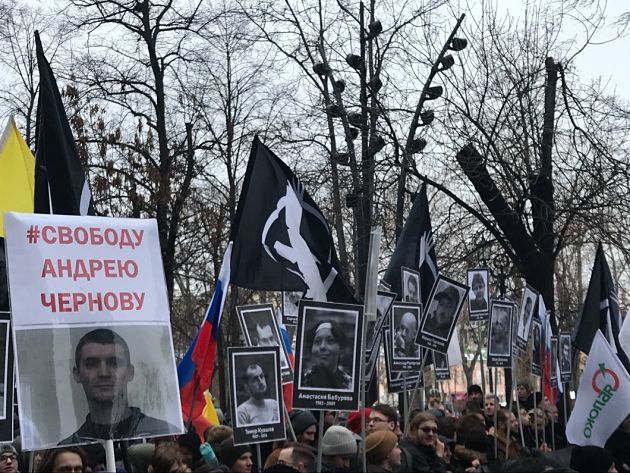Yesterday about ten thousand people in Moscow and hundreds of people in other cities of Russia and abroad took part in the commemoration of the fourth anniversary of the public assassination of Boris Nemtsov near the Kremlin walls. From the slogans and the general mood of these actions, from the portraits of other victims of political assassinations present at them, it can be concluded that these were memorial actions not only for Nemtsov. People remembered all those who gave their lives resisting the tyrannical system, and those who still remain in its clutches for political reasons (and there are already thousands of them), and they demonstrated their desire to continue their struggle.
For us Muslims it is important that ordinary Russians, among other new martyrs, carried the portraits of our co-religionists, including Orkhan Dzhemal, Timur Kuashev and Alexander Litvinenko. “We will remember each one of them” was written on a long banner under their portraits and a dozen other well-known journalists, human rights activists and dissidents who were killed by bullets, poison and the cruelty of the regime’s executioners. These actions, of course, brought together people from different backgrounds, including those with views that are completely incompatible with Islam. But it must be understood that what unites them all at this moment is their rejection of tyranny, censorship, tightening of the screws, isolation from the outside world, military adventures, and their desire to live in a country where there is freedom of speech and assembly, where there are independent courts and media, civil society, political competition, and freedom of religion. In other words, everything that Muslims in Russia desperately need.
And what about themselves? As can be seen, ordinary Russians carry portraits of Muslims killed by this regime as their heroes. At the same time, despite the presence of small columns and groups of representatives of various democratic, leftist, and nationalist organizations on the march, the organized Muslim presence was absent (although there were individual Muslims present).
On the one hand, the reasons for this are understandable – compared to other sectors of civil society in Russia, the Islamic sector has suffered and continues to suffer one of the most brutal blows of the repressive system. And those few Muslim civil leaders who could have been in the forefront alongside liberal, leftist, or nationalist leaders are either killed, behind bars, or abroad.
On the other hand, in Russia, despite everything, there are still a certain number of independent Muslim politicians and journalists – literally on the front lines – who put their lives in danger on a daily basis. And when they do, it would be reasonable to strive for them, as the real representatives of Muslims, to be at the forefront, along with other leaders of civil society.
After all, Muslims today are paying a high price for their values, and therefore it is important that they are ready to reap the fruits at the right time instead of missing them once again.

